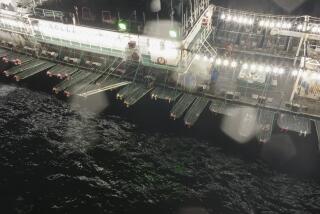Navy Captain Faces Charges for Leaving Hungry Boat People
- Share via
WASHINGTON — The captain of the Navy’s amphibious landing ship Dubuque has been charged with two counts of violating lawful orders for failing to rescue a boatload of Vietnamese refugees who claim they later resorted to cannibalism to survive.
Capt. Alexander G. Balian, 48, flew to San Diego on Sunday after being notified of the charges and is scheduled to appear Wednesday at a hearing, Cmdr. David Dillon, a Pacific Fleet spokesman, said today.
Balian has been assigned a Navy lawyer and is currently preparing to appear before Vice Adm. George W. Davis Jr., the commander of surface ships in the Pacific Fleet, at a so-called “admiral’s mast,” the spokesman said.
Not a Court-Martial
Dillon said the captain had been charged under procedures within the Uniform Code of Military Justice for non-judicial punishment, meaning he is not facing a court-martial.
Davis will serve as the lone authority in considering the evidence. He could take a variety of disciplinary actions, including stripping Balian of his command, ordering a fine or issuing a letter of reprimand or censure.
Balian was temporarily relieved of his command of the Dubuque earlier this month while on patrol in the Persian Gulf pending the outcome of a Navy investigation.
Balian has been charged specifically with two counts of violating Article 92 of the Uniform Code of Military Justice for failing to heed a lawful order, Dillon said.
“One charge involves a Navy regulation and the other involves fleet operations orders,” the spokesman said. “But both the regulation and orders have to do with rendering assistance to people adrift on the sea.”
Gave Food and Water
The Dubuque encountered a boatload of Vietnamese refugees in the South China Sea while en route to the Persian Gulf. According to the Navy, the Dubuque provided the refugees with several hundred pounds of food and water and navigational aids, but did not take them aboard.
The boat people were eventually rescued off the coast of the Philippines and were taken to a refugee camp there, where reports of killing and cannibalism began to surface.
Some survivors have been quoted as saying they killed and ate some of their fellow passengers to stay alive after they encountered the Dubuque on June 9. Two of the victims reportedly died of starvation, but three others allegedly were drowned and eaten.
Some survivors said the Dubuque refused to take them aboard even though their boat was disabled and they were dying of exposure and starvation.
37 Days at Sea
According to Robert Cooper, the Manila representative of the U.N.’s refugee commission, 52 refugees survived 37 days at sea, but 58 people died during the crossing. The refugees began their journey on May 22 from the Mekong Delta town of Ben Tre aboard a 35-foot wooden boat. Its engine failed two or three days later.
Navy regulations specify that warships may pick up refugees on the high seas if the vessel they’re traveling in is judged unseaworthy, bad weather is approaching or there are “other special circumstances.”
“In other words, it’s a judgment call by the captain of the vessel,” Pentagon spokesman Dan Howard has said.
More to Read
Sign up for Essential California
The most important California stories and recommendations in your inbox every morning.
You may occasionally receive promotional content from the Los Angeles Times.













